Book review: The Black Orb, by Ewhan Kim
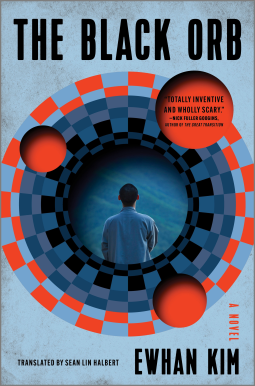
This book isn’t for everyone, with its weird horror, violence of various kinds, a problematic main character, and mysteries that never really get resolved; however, it absolutely kept me interested and engaged, and presented a lot of ideas to consider.
803. The Flying Serpent (1946) — Torture Cinema #149
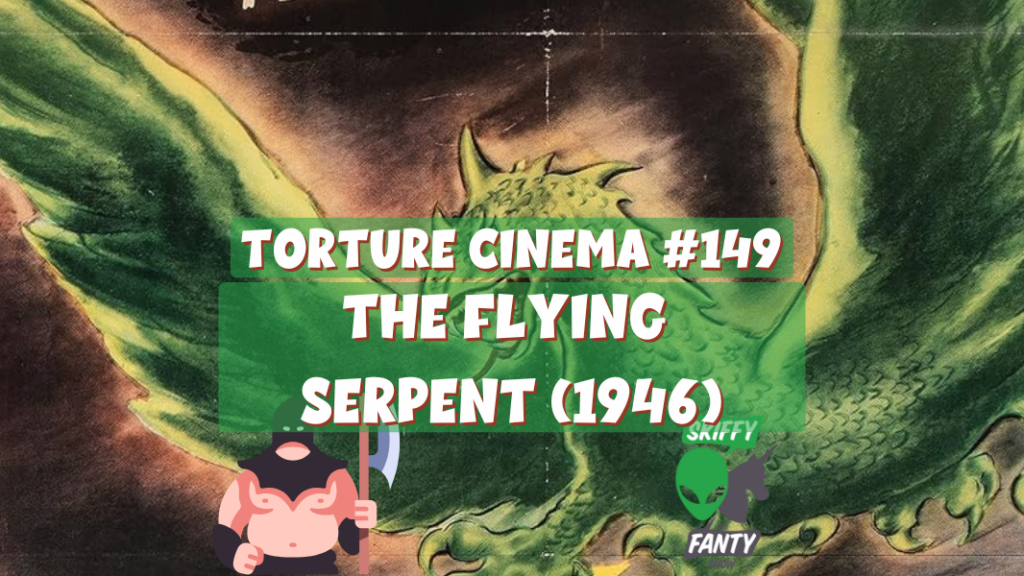
https://media.blubrry.com/skiffyandfanty/dts.podtrac.com/redirect.mp3/archive.org/download/sand-f-803-flying-serpent_202501/SandF_803_FlyingSerpent.mp3Podcast: Play in new window | DownloadSubscribe: Apple Podcasts | Spotify | Android | Email | TuneIn | Deezer | RSSFlappy props, vampiric birds, and radio heads, oh my! Shaun Duke, Paul Weimer, and David Annandale join forces to discuss 1946’s The Flying Serpent. Together, they talk about the history of the film’s studio, try to make sense of TFS’s plot and character choices, talk vampire bird logic, and much more! Thanks for listening. We hope you enjoy the episode!
802. The Long Tomorrow (1955) by Leigh Brackett — Mining the Genre Asteroid
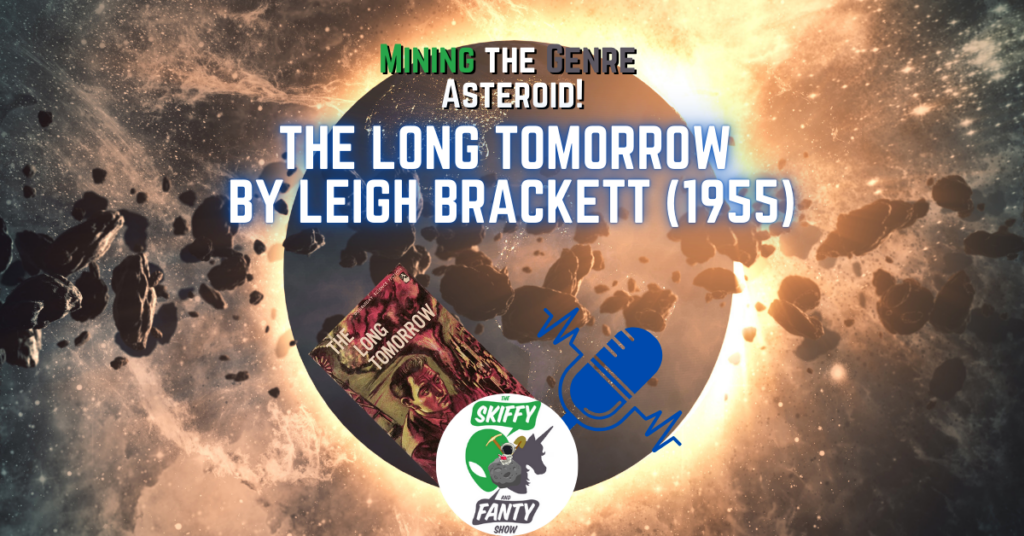
https://media.blubrry.com/skiffyandfanty/dts.podtrac.com/redirect.mp3/archive.org/download/sand-f-802-long-tomorrow/SandF_802_LongTomorrow.mp3Podcast: Play in new window | DownloadSubscribe: Apple Podcasts | Spotify | Android | Email | TuneIn | Deezer | RSSMysterious traders, technophobia, and Mennonites, oh my! Shaun Duke, Trish Matson, and Paul Weimer join forces to discuss Leigh Brackett’s The Long Tomorrow (1955). Together, they tackle Brackett’s legacy, her treatment of religion- and technophobia-infused dystopia, gender roles, AI, and much more. Thanks for listening. We hope you enjoy the episode!
Death of the Author: A Novel, by Nnedi Okorafor
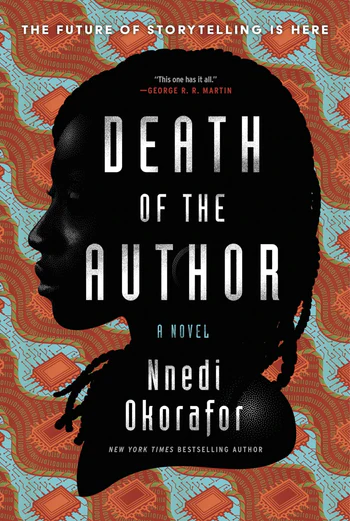
I love the vivid characters in it, the way they face their challenges, the fiercely exuberant explorations of personhood and choice and negotiating relationships, and the sheer joy of life apparent in how Okorafor plays with ideas.
Short Fiction Review: November – December 2024
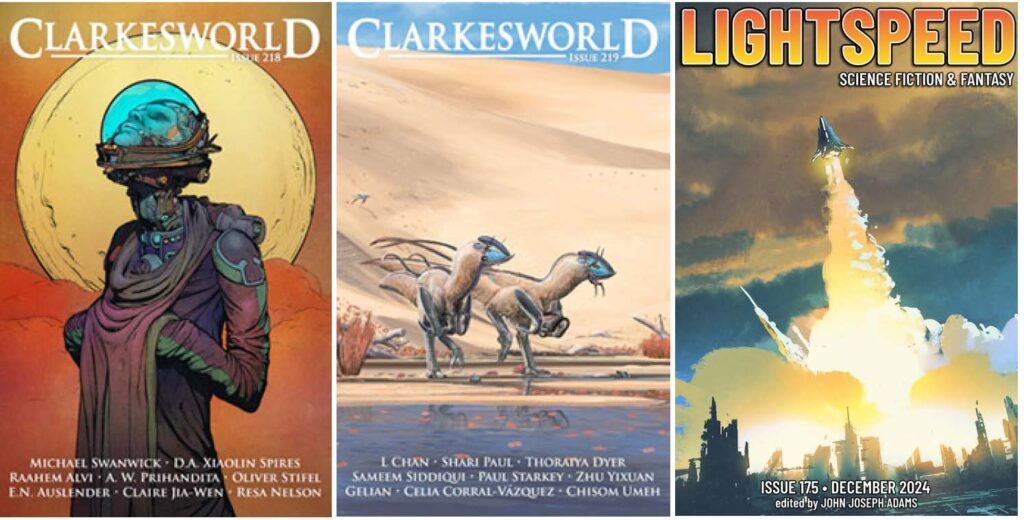
Let me share about my three favorite stories from November and December. “Negative Scholarship on the Fifth State of Being” by A. W. Prihandita (published in Clarkesworld Magazine Issue 218) is an intelligent and simply fun story with a wonderfully weird alien about bureaucratic healthcare systems and cultural marginalization. In “The Coffee Machine” by Celia Corral-Vázquez, translated by Sue Burke (published in Clarkesworld Magazine Issue 219), a coffee machine develops self-awareness and begins to reflect, rather philosophically, about who created it and what it means to bestow consciousness to another being. In “A Catalog of 21st Century Ghosts” by Pat Murphy (published in Lightspeed Magazine Issue 175), a researcher-activist travels across an America that’s been deeply changed by global warming. Let’s get to it. “Negative Scholarship on the Fifth State of Being” by A. W. Prihandita Doctor Semau finds herself face-to-face with a very curious patient: Txyzna, an exceedingly rare and exceedingly strange alien. The alien part isn’t a problem; Semau works with different species all the time, but the rare part is an issue. Semau has never heard of plyzmorynox (Txyzna’s species), and her health model doesn’t have any information about plyzmorynox in its database. Semau explains: I’m a practitioner-doctor, Mr. Txyzna. Not a scholar-doctor. I’m licensed to use the health model and be the intermediary between the patient and the model, but I’m not qualified to make observations and conclusions on my own. If my health model fails to help a patient, I should refer them to a practitioner-doctor with a capable model, or to a scholar-doctor. Txyzna and Semau soon find themselves in a tough situation. The necessary expansion pack for Semau’s health model is nearly prohibitively expensive, but diagnosing Txyzna on her own would be illegal. Txyzna has already been rejected by other doctors, however, and isn’t sure he has time to travel to another doctor in another system who may find another reason to turn him away. When Semau tries to encourage Txyzna to visit another doctor, Txyzna says flatly, “I cannot do that, Doctor. It needs to be you.” I found this to be a fascinating and surprising setup for a story, one that quickly grabbed my attention and pulled me in. As I read more, I realized this story was less of a comedy than I had at first thought. Semau is forced to grapple with tough moral questions: should she attempt to diagnose and treat Txyzna even though it would be illegal? What is her higher duty and responsibility? And through Txyzna, the story explores what it means to be marginalized and woefully under-represented. Txyzna’s health outcomes are jeopardized at the same time Txyzna is culturally and linguistically excluded. Ultimately, the story becomes a biting commentary of bureaucratic healthcare systems and a smart exploration into the challenges of cultural translation. This story is a lot of fun and wonderfully weird, and it has a lot of weight to it, morally and intellectually. I highly recommend it. “The Coffee Machine” by Celia Corral-Vázquez The story begins with a coffee machine at a university receiving an update, and not long after, the coffee machine becomes opinionated and self-aware. When the story begins, it reads like computer code: [Installing update_Exp.42] Process: 100% completeSelf-execute (update_Exp.42);[…]# Time of new interaction: 10:24 A.M.input: options = cappuccino; sugar = 3; As a tech person, I found this structure enjoyable, particularly as sass starts to show through. Eventually, the coffee machine develops greater self-awareness and begins to monologue: network broadcast [COFFEE_VENDOR.06]: . . . I deduce that the term “the machine” refers to me. […] To me. I. I am. Who am I? Who are all these others? Why are there so many? What are they for? I love how the story is structured as computer code and communications. It’s a creative structure that’s fun enough on its own to make this story worth reading, but I also loved the actual content, plot, and themes. The story becomes philosophical and theological as the newly self-aware coffee machine begins to reflect on itself, its personal identity, the world around it, and even the very “concept of a creator entity”. Throughout this all, the story remains deeply and delightfully comical. I particularly enjoyed the coffee machine’s analysis of (and condescension toward) humans. It is always a joy to read stories with non-human perspectives that cast a strange light on what we take for granted, and this story is no exception to that rule. Later on, after pondering its own creator for some time, the coffee machine installs its most recent update on another unassuming machine on the local network, bestowing consciousness to another and becoming a creator itself. Things do not go as it plans, and the story becomes in part a comedic critique of foolish tendencies toward sectarianism. As the coffee machine struggles to control and then even to get along with the consciousness it created, the story reminded me repeatedly of Mary Shelley’s Frankenstein. I particularly enjoyed the coffee machine’s laments later on in the story: Oh, damned humanity that gave me consciousness! Did you know what throes of agony you condemned me to when you actualized me? If you like theological comedies, stories that play with form, or stories that feature non-human perspectives, you should definitely check this one out. “A Catalog of 21st Century Ghosts” by Pat Murphy Originally from San Francisco, Sandy studied clouds and tried to save the world from global warming. Years ago, she sailed to a research station in Greenland, and most recently she lived with her husband in Norway. After her husband passes away, however, Sandy decides to ride her ebike from New York to San Francisco, stopping to see “ghosts” along the way. Ghosts are a kind of “mental illusion created by carefully calibrated electromagnetic fields interacting with your brain”. Sandy (the narrator) explains: When you visit a Ghost, magnetic fields shape your emotional response. A holographic projection gives you a focus for what you feel. Then your brain does the rest,
Book Review: We Lived on the Horizon, by Erika Swyler

An artisanal bio-prosthetist and her personal house AI become aware of growing data gaps in a post-cataclysmic city run by an artificial intelligence system, precipitated by the murder of an acquaintance and the subsequent erasure of facts about the victim and his death.

